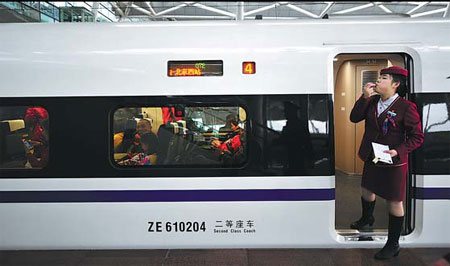Train line slashes travel time between big cities
Updated: 2013-01-04 09:45
By Zhao Lei (China Daily)
|
|||||||||||
|
An attendant whistles for passengers to board the high-speed train for Beijing at Guangzhou South Railway Station on Dec 26. The train was set for its maiden journey on the world's longest high-speed track. Ke Xiaojun / China News Service |
Trip that used to take the best part of a day now takes just eight hours
The train left Beijing, with patches of snow dotting the capital, at 9 am on a chilly late December morning before it whizzed past green rice fields when it crossed the Yangtze River four hours later. At 5 pm it arrived in flower-dotted, subtropical Guangzhou, where the temperature was 20 C higher than in Beijing when the trip began.
The world's longest high-speed rail link, connecting Beijing and Guangzhou, the capital of Guangdong province, became fully operational on Dec 26. The 2,298-km line cuts the journey time from more than 20 hours to about eight and connects 28 cities, including five provincial capitals. The designated speed of the route is 350 km/h, although the initial operating speed is about 300 km/h.
Fifteen minutes after the train departed from Beijing West Railway Station, the speedometer hit 300 km/h, which was maintained for almost the entire journey, the exception being between Xuchang in Henan province and Hengdian in Hubei province, because of heavy snow.
The CRH380A(L) train in service on the new line has undergone extensive tests around the country, so its reliability is assured, said Wu Donghua, an engineer at CSR Sifang Co, one of China's biggest bullet-train makers.
Zhou Li, director of science and technology with the Ministry of Railways, said the authorities had undertaken a series of measures to ensure safety, such as intensifying the maintenance of fixed equipment and mobile devices on board and improving the control system to address potential problems in extreme weather.
The train's internal temperature was maintained at a comfortable level, with a low of 18 C.
The train is equipped with special washrooms for the disabled and can serve four different types of cuisine.
Zhang Wei, an electrical engineer from Cangzhou in Hebei province, left home at night and traveled three hours by coach so he could "have the unforgettable experience of being on the first train on the line".
He was impressed with the facilities and service, he said, but not the price. His first-class seat cost 1,383 yuan ($221; 167 euros), more expensive than an economy-class air ticket. Seats in second class cost 865 yuan.
The new line appears to be winning over people who would otherwise travel by air.
Yang Zengyu, a businessman, who boarded at Zhengzhou, said he preferred to take the train to Guangzhou. "A journey on the train is more pleasant. The price is fine. Also, the rail network has expanded so quickly that the trains go everywhere. Even for frequent flyers like me, railways are an attractive alternative."
However, he did have one gripe. "It would be even better if we could access the Internet on the train."
Wang Hui, deputy dean of the School of Economics and Management at Shijiazhuang Tiedao University in Hebei, said the train signals new economic opportunities.
"The Beijing-Guangzhou high-speed railway connects the economic area around Beijing with the Pearl River Delta. Considering the population and levels of development of the two economic zones, they are undoubtedly important engines for China's economy, therefore improving the transport system will definitely increase exchanges between the two in terms of investment, talent and information."
Tian Xuebin, an economics researcher at Hebei University of Economics and Business, said the new link will advance the economic integration of cities along the line, give a fillip to industry and bring more opportunities.
Slower but cheaper train services are being retained on the old Beijing-Guangzhou line.
The Beijing-Guangzhou high-speed line will extend to Hong Kong as early as in 2015, the Railways Ministry said.
China aims to establish a high-speed railway backbone network featuring four east-west lines and four north-south lines by the end of 2015. The length of the high-speed lines is expected to reach 18,000 km by that year, Xinhua News Agency said.
While making substantial profits domestically, Chinese railway contractors have been striving to export their technologies, products or services of high-speed railways.
In April, China CNR signed a deal to make traction equipment and network control systems for a customer in Bangladesh. It is the first time a Chinese enterprise has exported this advanced technology, used in multiple-unit trains, Chinese media have reported.
zhaolei@chinadaily.com.cn
(China Daily 01/04/2013 page3)
Today's Top News
Police continue manhunt for 2nd bombing suspect
H7N9 flu transmission studied
8% growth predicted for Q2
Nuke reactor gets foreign contract
First couple on Time's list of most influential
'Green' awareness levels drop in Beijing
Palace Museum spruces up
Trading channels 'need to broaden'
Hot Topics
Lunar probe , China growth forecasts, Emission rules get tougher, China seen through 'colored lens', International board,
Editor's Picks

|

|

|

|

|

|






